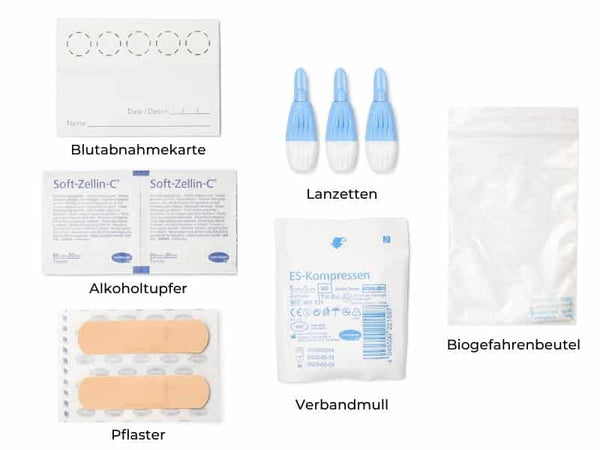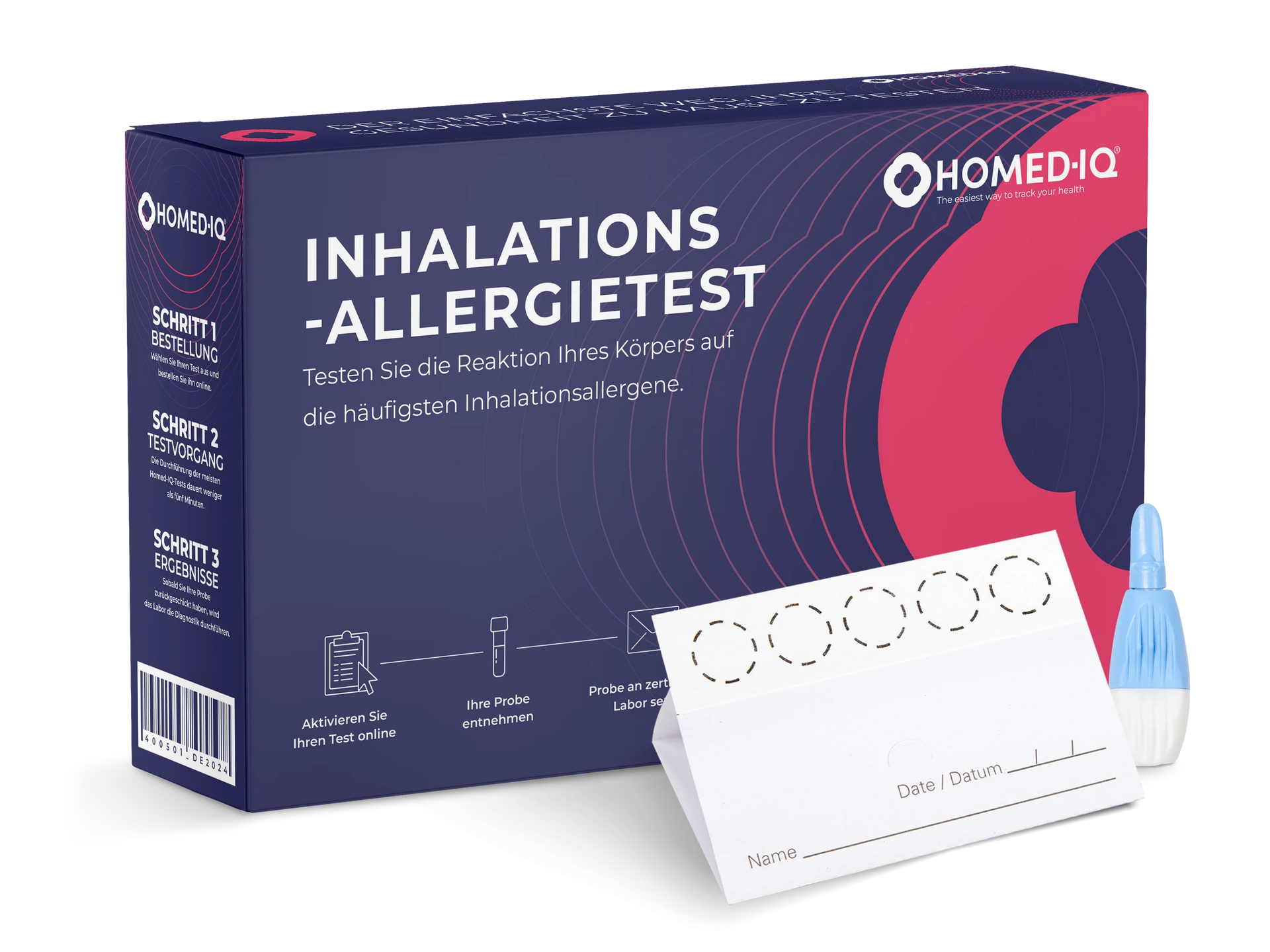Inhalation Allergy Test
FREE SHIPPING TO
Are you experiencing symptoms like sneezing, watery eyes, or itchy skin, but are unsure of the cause? Learn your reactivity to common inhalation allergens that may be triggering symptoms, including grasses, trees, moulds, dust, and pet allergens. Identifying specific allergens can allow you to take steps to reduce your exposure and alleviate chronic symptoms.
Test mode:
Dried blood spot test
What do we test for?
Animals, Dust Mites, Grass Pollens, Latex, Moulds, Tree Pollens, Weed Pollens
This test measures IgE reactivity to 30 allergens. If an IgE reaction is visible in your result, this may indicate a possible allergy.
This test checks for the presence of the following allergens:
| Category | What is tested? |
| Animal hair and dander | Dog, cat, rabbit, horse |
| Mites | Dust mites (Dermatophagoides pte, Dermatophagoides farinae, Blomia tropicalis), Flour mite (Acarus siro) |
| Moulds | Candida Albicans, Aspergillus fumigatus, Alternaria alternata |
| Grass Pollens | Bermuda grass, Orchard grass, Timothy grass, Meadow Grass, Cultivated rye, Cultivated wheat |
| Tree Pollens | Silver birch, Hazel, Oak, Olive, London plane, Italian cypress, American Ash |
| Weed Pollens | Ragweed, Mugwort, English Plantain, Wall Pellitory |
| Other | Cockroach, Latex |
Please note: an official allergy diagnosis requires a follow-up appointment with a GP and/or allergist.
How does our allergy test work?
1. Collect the blood sample
The test kit contains everything you need to easily collect a blood sample. Using the lancets provided, prick yourself in your finger and fill 5 circles on the dried blood spot card with blood. This provides enough material for accurate analysis.
2. Return the sample
Once you have collected the blood sample, return it to our laboratory in the provided prepaid return envelope.
3. Analysis and test results
At the laboratory, your blood sample will be analyzed for reactivity to 30 allergens. When the test results are available, you will be notified by email and text message.
Does this test control for cross-reactions?
Cross-reactions in allergies occur when the proteins in one allergen are similar to proteins in another allergen. This can mean that the IgE antibodies that are produced against one allergen may also bind to other allergens, creating an allergic response. For example, someone with a tree pollen allergy may also experience a reaction to apples, as these allergens are very similar.
Homed-IQ’s allergy tests take many known cross-reactions into account by examining the specific components that make up an allergen, allowing for differentiations to be made between similar allergens. While this reduces the likelihood of your test results being affected by cross-reactivity, certain test results may require additional analysis due to potential cross-reactions. Therefore, we always recommend that you discuss all test results with an allergy specialist.
What are allergies?
Allergies occur when the body’s immune system reacts abnormally after being exposed to certain substances that it perceives as a threat. These substances are known as allergens. During this reaction, your immune system releases a number of chemicals to protect the body and prevent the spread of the allergen, causing allergic reaction symptoms. These symptoms can include a runny nose, watery eyes, sneezing, and itching. Allergic reactions can occur to a variety of things, such as food, medications, pollen, dust, or animals. Allergies to substances that are not easily seen in our environment, like pollen or certain trees, can be particularly hard to identify and are usually generalized as “hayfever”. However, knowing the specific allergens you are sensitive to can help you avoid exposure and reduce chronic symptoms of allergies.
What are IgE antibodies?
Allergic reactions are caused by a specific antibody in the immune system called immunoglobulin E (IgE). Testing the amount of IgE in your blood in response to certain allergens can indicate whether your body may develop an allergic reaction to certain substances or not. The amount of IgE in your blood cannot indicate specific symptoms in response to an allergen or their severity, but can point to potential allergy triggers that should be investigated further.
This test assesses your IgE reactivity to 30 common indoor and outdoor allergens using a simple finger-prick blood sample that can be taken from home. The results of this test can be used to make efforts to remove the allergen from your home and immediate surroundings, or direct allergy treatment to alleviate symptoms.
This test examines how your immune system responds to 30 specific environmental allergens by measuring whether an IgE immune response occurs. A positive reaction may indicate a sensitivity or allergy to these substances. It is important to discuss your test results with a physician if there is an allergic reaction. Together, you can determine if further steps are necessary for a definitive diagnosis of allergy.
You will receive a detailed summary of your reaction to each of the allergens, ranked by degree of reactivity.
If my test result is reactive, does that mean I definitely have an allergy?
Not necessarily. An allergy test alone cannot diagnose an allergy. Allergy test results must be interpreted by a doctor along with your symptom history. They may also order additional tests to confirm the allergy. Use your results as a basis for further discussion with an allergy specialist or healthcare provider to determine the best course of action.
What guidance will I get with my results?
Your test results will include:
An overview of your IgE reactivity level to each of the 30 allergens tested, ranging from very low to very high.
Information on each allergen and guidance on when and where you may encounter it and how it can affect your daily life.
Practical advice on how to avoid allergens and reduce your symptoms.
Information on how to get in touch with a medical specialist through our digital platform.
Below is an overview of the different reactivity categories (0 to 6). It is also explained what the reactivity means for a possible allergic reaction.
| Class | Reactivity |
| 0: No reactivity | No IgE reactivity. These allergens are unlikely to cause symptoms. |
| 1 to 2: Low reactivity | Low IgE reactivity has been detected to these allergens. You may have an allergy to these environmental allergens if you experience adverse symptoms after inhaling them. If you encounter symptoms, speak to your doctor about potential diagnosis and treatment for allergies. |
| 3 to 4: Significant reactivity | Significant IgE reactivity has been detected to these allergens. You may have an allergy to these environmental allergens if you experience adverse symptoms after inhaling them. If you encounter symptoms, speak to your doctor about potential diagnosis and treatment for allergies. |
| 5 to 6: High reactivity | High IgE reactivity has been detected to these allergens. You may have an allergy to these environmental allergens if you experience adverse symptoms after inhaling them. If you encounter symptoms, speak to your doctor about potential diagnosis and treatment for allergies. |

What will my test results look like?
Your test results come with an explanation of your reactivity to each allergen and what that could mean for your allergy symptoms. It also includes:
Information about each allergen, where you may encounter it, and the specific times of year you should watch out for it. This is specifically relevant for tree, weed, and grass pollens, that can peak at specific moments during the year.
Your test result also comes with a downloadable laboratory report that you can bring to your doctor or an allergist for further testing and investigation. Allergies can be diagnosed by a doctor through a combination of test results, symptom history, and a physical examination.
Inhalation allergies often causes rhinitis, a condition involving a runny nose, sneezing, and itching. This is also known as hay fever, and affects millions of people worldwide.
Understanding what allergens you are reactive to is the first step towards getting to the root of your symptoms, breathing easier, and enjoying every season. Consider Homed-IQ’s Inhalation Allergy test as your pathway to a clearer, more enjoyable daily life.
Common inhalation allergy symptoms:
- Runny nose, roof of mouth, or throat
- Mucus that runs down the back of your throat (postnasal drip)
- Sneezing
- Watery or itchy eyes
- Hives
- Headache
- Earache
- Cough
How does it work?
Order your test
Fast and discrete letterbox delivery
Activate & take your sample
Video instructions included
Laboratory analysis
ISO - Certified lab network
Receive your results
Easy access through mobile




